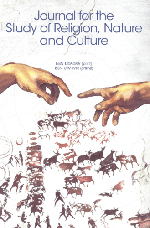Religion/Water/Climate:
Changing Cultures and Landscapes
A Conference Sponsored by the
International Society for the Study of
Religion, Nature and Culture (ISSRNC)
June 13-16, 2019
Hosted by
University College Cork
Cork, Ireland
** Submissions are now closed **
Note: The ISSRNC is trying an experimental online session format for the 2019 conference, which has a slightly different CFP, which you can find here (Online Session CFP). The application below for submitting a proposal is the same, but the instructions and requirements are different for the online session, as noted in the CFP.
Call for Papers
The ISSRNC welcomes papers, panels, and proposals from all disciplines that address the intersections of religion, nature, and culture. For this conference we especially welcome proposals that focus on religious and cultural responses to and conceptions of climate weirding, especially concerning water and climate change. The anthropogenic destabilization of global climate systems elicits responses from religious actors, but also precipitates religious questions. Of particular interest are places, ecosystems, and environmental processes where climate-induced hydrological changes have religious ramifications: coastal communities, desertification, wetlands, sea level rise, erratic rainfall, melting permafrost and glaciers, intensifying tropical storms, mangroves, fishing and fishermen, etc. By partnering with our hosts at the University College Cork, the ISSRNC seeks to advance conversations about the interconnections between water, climate, religion, and culture.
This conference advances the ISSRNC’s mission to “promote critical, interdisciplinary inquiry into the relationships among human beings and their diverse cultures, environments, and religious beliefs and practices.” At this conference, we hope to develop linkages between scholars of religion and other fields in the environmental humanities and social sciences that explore human ecology in its cultural complexity, critically engaging the patterns of social, economic, and religious organization that precipitate environmental degradation and identify emerging alternatives.
We seek papers and pre-arranged panel sessions from all disciplines that focus on the following thematic areas. In addition, we welcome any papers or panels addressing the nexus of religion, nature, and culture.
- The religious, social, philosophical, cultural, and spiritual implications of the impact of climate change on coastlines, wetlands, mangroves, melting permafrost and glaciers, rising sea levels, erratic rainfall, desertification, intensifying tropical storms, fishing, shipping, and water-based forms of tourism and pilgrimage
- Religious responses to climate change (e.g. theology, advocacy, activism, and adaptation)
- Religious and spiritual conceptions of water and activities and beliefs concerning sacred waters, such as rivers, springs and holy wells
- The impact of climate disruption on the movement of human and other-than-human beings; species migration, climate refugees and migrants
- The moral and mythic significance of climate related biodiversity loss and extinction
- Questions concerning ecological aesthetics, environmental ethics, planetary consciousness, and biological ontologies
- Cultures of resilience, in history, in practice, and in our imaginations
- The intersection of climate change, economic inequality, and gender justice
- Water security and environmental justice
- The consequences of climate change on human rights issues
- Climate change as it relates to religion and environmental racism
- The role and impact of public scholarship related to religion and climate change
Proposals and Deadlines
Paper proposals must include two documents: The first should be a 150-word abstract that includes the Title, as well as the name and contact information of the Participant. The second should be a 500-word (or less) description of the paper that includes the title, and indicates the methods, argument, and findings as well as the relevant literature engaged. Session proposals should include paper proposals for each participant as well as an overview document describing the session title, theme, participants, and order of presentation.
Proposals for sessions or events that would not fit the traditional session format are also encouraged. For instance, we invite proposals for an experimental online session that would enable ISSRNC members to present at the conference without physically attending. This session would consist of pre-recorded video presentations that would be available to all conference participants. The presenters would be expected to participate in an asynchronous online discussion of the presentation throughout the conference. We also plan to reserve space for a number of panels developed through new or existing ISSRNC online working groups.
Plus use the submission form below to submit your proposal by January 4, 2019.
Papers will be anonymously peer-reviewed by an international scholarly committee and decisions made by late January 2019.
All presenters must be members in good standing of the International Society for the Study of Religion, Nature and Culture by 1 April 2019. All scholars interested in religion, nature and culture are encouraged to support the Society by joining or renewing here. Presenters and session organizers are encouraged to submit their articles for publication, or their sessions for special issues, to the official publication of the ISSRNC, the Journal for the Study of Religion, Nature, and Culture (JSRNC).










